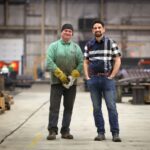
The world is watching Afghanistan with bated breath as harrowing images of refugees flood the internet and international airwaves. Vulnerable populations are being left high and dry as the Taliban’s influence solidifies across the country. All the while, partisan political infighting continues to distract the global community from a crucially important mission – saving refugees and integrating them into our increasingly international society.
Relocating humans across thousands of miles, finding them work and a safe place to live, and ensuring they integrate into their local communities is no small feat. Yet it’s a worthwhile endeavor that yields humanitarian and economic dividends alike.
Making the best of a bad situation
International experts are already racing forward to remind the world that we can make the best of a bad situation by resettling refugees in regions struggling for workers. Across the developing world, populations are reaching higher ages than ever before, leading to a critical shortage of young workers who fuel economic growth. According to the United Nations, “one in six people in the world will be aged 65 years or over” by 2050.
Germany, The United States, Japan, and many other major economies are thus in desperate need of young workers. Afghan refugees, on the other hand, are tenacious individuals willing to start new lives abroad if only they were permitted the opportunity to do so. Sending Afghan refugees to regions in desperate need of workers would enable these persecuted victims to start over while breathing new economic life into the communities that accept them.
Political leaders, titans of business, and international humanitarian groups must recognize the urgency with which we need to respond to this crisis. We must continue cultivating technology that generates a seismic social impact. Children are being born on airplanes as their parents desperately flee the country, and others are clinging to aircraft at breathtaking heights in the hope of escaping the Taliban. Every moment that the international community dithers in accepting and integrating refugees could mean another life lost.
Ensuring optimal outcomes for the marginalized
Vulnerable populations around the world seldom possess the political or economic power they need to gain a better lot in life. If global migrants and refugees are to seamlessly travel around the world to solve labour shortages, we must develop global infrastructure to help them. Platforms like Joblio stand ready to assist vulnerable populations as they navigate the perilous journey from their origin country to their new homes. It’s why Joblio is so proud of helping vulnerable migrants like Amal Elsayed.
“I know firsthand what it’s like to be a refugee,” notes Joblio CEO Jon Purizhansky. “Fleeing my home country as a boy and living as a refugee in Austria, Italy, and eventually America shaped my entire life. It’s a major reason why I started Joblio, a global technology platform that can help migrants find empowerment abroad through well-paying jobs in safe conditions.”
Ensuring optimal outcomes for the marginalized requires digital tools and the knowledge of how to use them. It’s already known that technology can make an important social impact if only it’s wielded by the right people with ethical motivations. Currently, a lack of tools for coordinating the global movement of people is leading to serious abuses and corruption in the evacuation and resettlement of refugees. Standardization is sorely needed across the world.
“Our mission is to set the global standard when it comes to safely helping vulnerable migrants find new work and lives abroad,” said Purizhansky. “With our technology, corruption and inefficiency in human relocation can become a thing of the past.”
Rendering corruption obsolete
Wherever migrants or refugees can be found, corrupt practices that prey upon these vulnerable people crop up. In Afghanistan, private rescue efforts have grown so frenzied that American defense contractors are charging up to $6,500 per person for a flight out of Kabul. When technological innovators fail to step up and solve important social problems, the most vulnerable among us suffer when their plight is monetized by wealthy actors who seek to profit from chaos.
More than ever before, we must reject efforts to cash in on the suffering of migrants, refugees, and vulnerable persons. It’s not enough to simply understand the migrant community – we need to lend a helping hand, too. We should loudly support current resettlement efforts and help migrants find affordable housing and careers as soon as possible. With platforms like Joblio, the entire process of relocating and integrating migrants can be streamlined.
The continued development of platforms like Joblio will help mitigate migration crises of the future. By allowing individuals around the world to communicate directly with employers, the Joblio platform can ensure global relocation occurs ethically and without a hitch. With a global commitment to help vulnerable persons on the move, we can render corruption obsolete and prioritize the upholding of human rights around the world.






